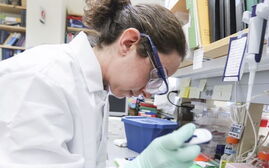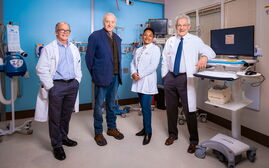Vitamin helps prevent certain vision loss, JAX researchers find
 Courtesy / Jacksont Laboratory
Jackson Laboratory researcher Simon W.M. John, working with Pete Williams, found that giving mice predisposed to getting glaucoma vitamin B3 in water prevented them from getting the eye disease, which is common in humans. The research is seen as potentially providing new options for treatment of glaucoma.
Courtesy / Jacksont Laboratory
Jackson Laboratory researcher Simon W.M. John, working with Pete Williams, found that giving mice predisposed to getting glaucoma vitamin B3 in water prevented them from getting the eye disease, which is common in humans. The research is seen as potentially providing new options for treatment of glaucoma.
Taking vitamin B3 in water may slow or prevent the slow vision loss from glaucoma, an eye disease that eventually leads to blindness and has no cure currently, researchers at Jackson Laboratory found.
While their tests were done in mice genetically predisposed to getting glaucoma and prevented them from getting the disease, the hope is that some day the vitamin could help some of the 80 million people worldwide who suffer from the disease, they said in a study published in the Feb. 16 issue of Science magazine.
Some current treatments can slow or halt vision loss, but the damage is irreversible.
The vitamin works by keeping cells healthier longer, according to JAX researcher and Howard Hughes Medical Investigator Simon W.M. John and his colleagues. It potentially could be an inexpensive and safe treatment for people.
“By understanding the general age-related mechanism, there is the potential to develop new interventions to generally protect from common age-related disease processes in many people,” John said in a statement when the study was published.
JAX seeking partners for clinical tests
Most glaucoma sufferers have harmfully high pressure or intraocular pressure inside their eyes that leads to the progressive dysfunction and loss of retinal ganglion cells, which in turn connect the eye to the brain via the optic nerve. Aging is a key risk factor for glaucoma.
By studying the mice, the researchers found that a molecule vital to energy metabolism in neurons and other cells declines with age, and in turn reduces the reliability of the neurons to metabolize energy, especially when they are under stress.
“There’s an analogy with an old motorbike,” John said. “It runs just fine, but little things get less reliable with age. One day you stress it: you drive it up a steep hill or you go on a really long journey and you get in trouble. It's less reliable than a new bike and it’s going to fail with a higher frequency than that new bike.”
The vitamin B3 treatments in the mice boosted the metabolic reliability of aging retinal ganglion cells, keeping them healthier for longer.
“Because these cells are still healthy, and still metabolically robust,” added JAX postdoctoral associate Pete Williams, the first author of the study. “Even when high intraocular pressure turns on, they better resist damaging processes.”
John added in a statement that the team is pursuing clinical partnerships to begin testing the effectiveness of vitamin B3 treatment in glaucoma patients. They are also exploring potential applications for the treatment in other diseases involving neurodegeneration.
The research was funded by the National Eye Institute grant, the Barbara and Joseph Cohen Foundation and the National Heart, Lung and Blood Institute.














Comments